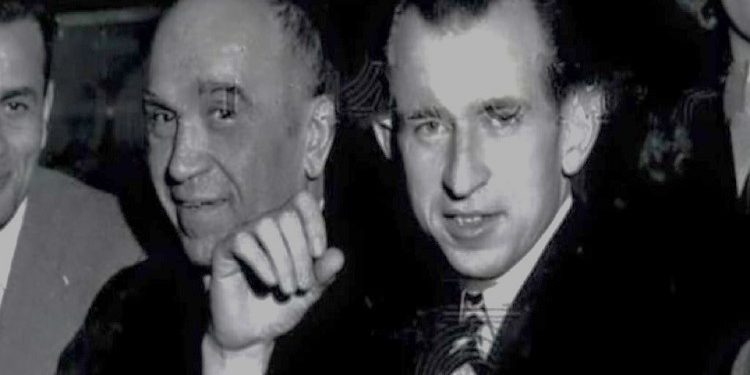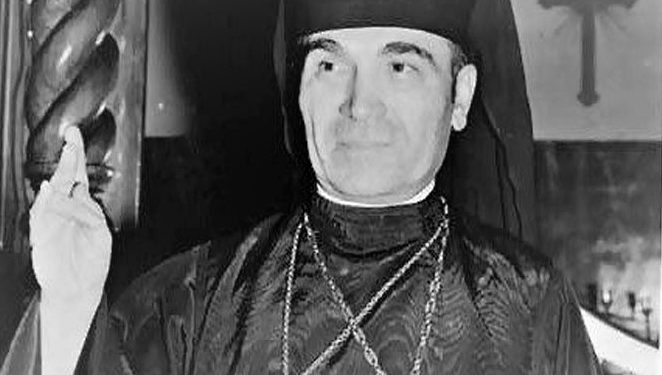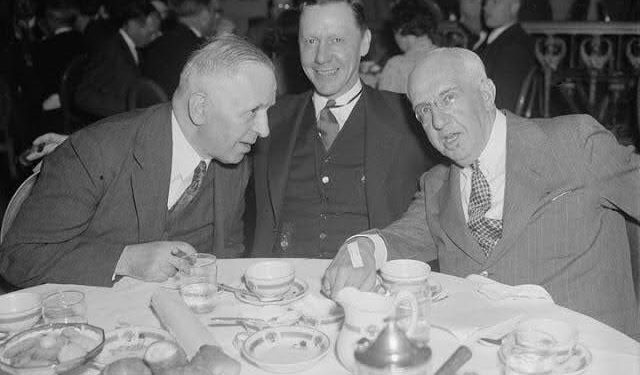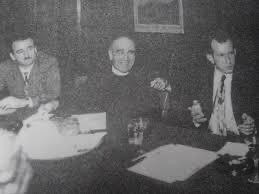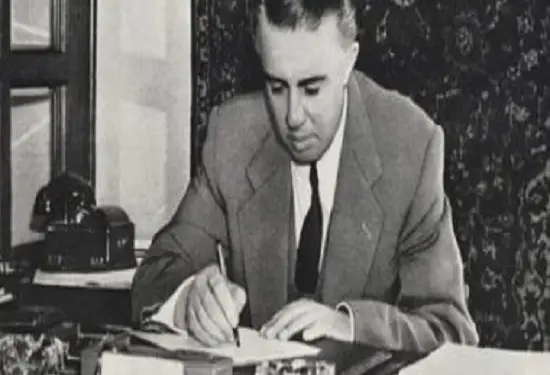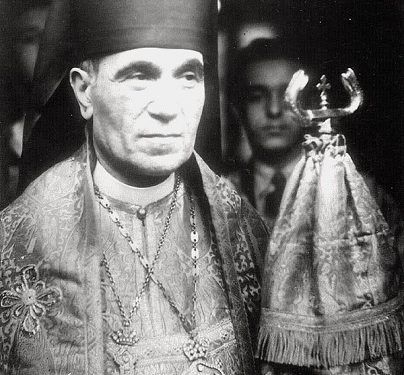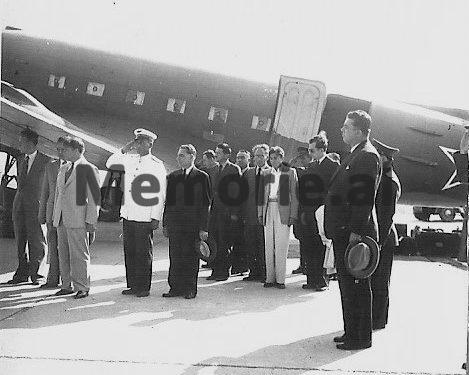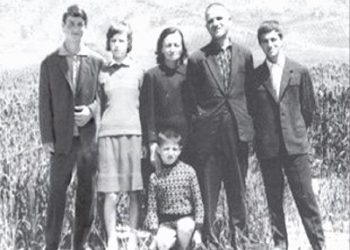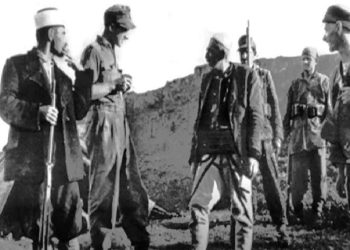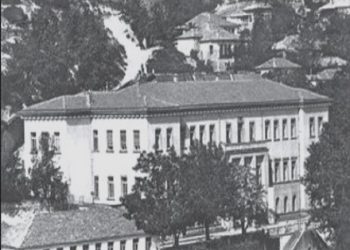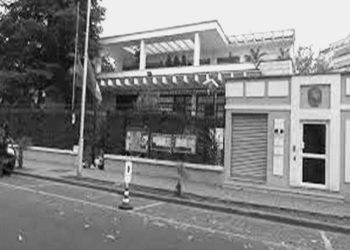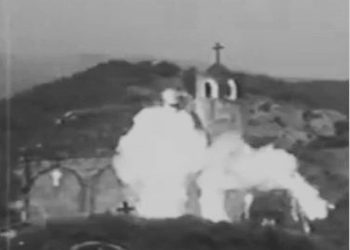The first part
Memorie.al / When a little more than a year had passed since the end of the Second World War, at the end of August 1946, a delegation of the Albanian government, headed by Colonel Tuk Jakova, (who at that time held the post of the President of the Assembly of the People’s Republic of Albania), made a visit to the USA, where he held a series of meetings with State Department officials and the focus of their conversations was the review of some official agreements concluded between the two countries before April 7, 1939 , as well as some still unresolved problems of the Albanian state, with its neighbors of the Balkan peninsula, mainly Greece, or with the Italian state, for war reparations, etc. But in addition to these meetings with American government officials, the Albanian delegation also had several meetings with Monsignor Fan S. Nolin, the Bishop of the Albanian Orthodox Church in the USA, who at that time volunteered to help the Albanian delegation and the government, which they represented in various problems, which they would present in the meetings they would hold at the American State Department, etc. As we will see in several letters that Bishop Fan S. Noli would later send to Prime Minister Enver Hoxha, he was very disappointed by the meetings with the Albanian delegation and mainly with the head of the delegation, Colonel Tuk Jakova, for whom he expresses with very negative grades, even reaching the level of abuse from the lowest. All this is revealed in the book ‘Noli – Work 6’, which was published in 1996, under the auspices of the Academy of Sciences of the Republic of Albania, where, in addition to the correspondence with Enver Hoxha, there are Noli’s interviews, speeches and various conversations, his biography, etc., parts of which we are publishing in this article.
The letters of Bishop Fan S. Noli, sent to the Albanian Prime Minister, Colonel-General Enver Hoxha, in 1946
Prime Minister Enver Hoxha
TIRANA ALBANIA
The Albanians of the United States and I, together with them, have followed your heroic struggle with deep emotion and rejoiced beyond words for your excellent successes. We feel proud of you because you are the only military leader in this war who succeeded in liberating the country from foreign occupation by his own forces without the help of any friendly liberation army: you are also one of the few governments that can stand on its own two feet, unsupported by friendly armies of occupation.
Moreover, we wholeheartedly endorse your policy of close cooperation with Yugoslavia and its great leader, Marshal Tito, under whose inspiring leadership we hope to have a Federation of all the peoples of the Balkans, thereby establishing a lasting peace in our restless peninsula. Please convey my heartfelt greetings to all your colleagues who have participated in your crusade so hard and so skillfully and to all the Albanian people, who stood steadfastly and loyally by your side.
God Bless You All.
Bishop F. S. Noli
* * *
General-Colonel Enver Hoxha
With great pleasure I received your warm and generous message, as well as the letter from my good friend and colleague Sejfulla Malëshova. I really want to be there with you, but today I can’t, because the trips are limited, besides there are other obstacles…! I may pay you a visit after Easter, so I will meet again, with my old friends. I have many reasons that prevent me from running for office in Albania.
I assure you that you have my full support and you can use my name in the electoral campaign for the people to vote for the Front. Also, please reach out to me for anything I can do in this matter. I wish you and your colleague’s success, as you deserve, in the election for the Constitutional Assembly.
God be with you
Bishop Fan Noli, on 13.X.1945
* * *
General-Colonel Enver Hoxha
Faik Konitza expressed his last wish to be buried in his birthplace. Stop. Please let us know the most suitable time to do the honors of accepting the body of the first fighter for the Independence of Albania. Stop. His friends and admirers will take care here for the conveyance of his body, stop. The Albanians here will be extremely happy if you send them a short greeting on Independence Day /Stop/
Monsignor Noli
* * *
Message to Enver Hoxha
March 23, 1946
In a note, the “New York Herald Tribune”, on March 23, writes that despite Albania’s request presented to its Yugoslav neighbor, aided by Czechoslovakia and pushed by the Soviets, Philip Noel Baker, British Minister of State, seized the opportunity at the meeting of the UNRRA Council to inform the Soviet delegation, thus Russian, that the Security Council will not consider a similar request for membership in the UN because it has other important business and will probably not act until September . In connection with this, it is whispered that England will withdraw the recognition previously given to Albania.
Bishop Fan Noli
* * *
Message to Enver Hoxha
On March 23, 1946
I found out from the talks I had with State Department officials that the acceptance of the treaties concluded by the previous regime is a necessary condition for the recognition of the Albanian Government by the United States. I believe that now any delay will prejudice our case at a critical time. Taking into account the imminent discussion in the UNO of Albania’s request for membership and the intense Greek agitation over Northern Epirus, I suggest that the treaties in question be accepted immediately. This acceptance will automatically bring American recognition, will eliminate obstacles for admission to UNO and will facilitate our work of successfully protecting Albania’s territorial integrity.
Bishop Fan Noli
C/C Ross C. Hurrey 1034 Washington
Letter of Bishop Fan Noli, addressed to Prime Minister Enver Hoxha, on September 30, 1946
On September 30, 1946, Bishop F. S. Noli from Boston, USA, wrote a letter full of indignation and anger to the Albanian Prime Minister, Colonel-General Enver Hoxha. The reason is the disagreements he had with the Albanian delegate, Colonel Tuk Jakova. After a lot of advice, unreserved help, intervention in the ranks of personalities, Noli received as a reward, the constant doubts of Colonel Jakovo, even baseless accusations. Known for all the behind-the-scenes, diplomatic blunders and arrogance of Jakovo, Noli wrote in detail to Prime Minister Hoxha, all his dissatisfactions regarding the visits and meetings of the Albanian delegation. This letter, extracted from the collection “Noli – Act 6”, is published in full, as follows.
Boston, September 30, 1946
General Enver Hoxha
Prime Minister of Albania in Tirana
September 30, 1946
Mr. Prime Minister:
Colonel Tuk Jakova, in the farewell he published in “Diellin”, September 18, closed here, opened the war to me with some ugly accusations and insinuations. I can’t answer it universally for now, because I don’t want to embarrass the governor at this critical time, even indirectly, by hitting her delegate.
I will speak after the crisis is over. As for now, I can only cry to you, for sending us this uncarved cartilage.
To begin with, the colonel does not know Albanian, or Georgian, or Tosk; In every dialect I spoke to him, he did not understand me because he is an uncultured fool.
Never in my life have I been as depressed as when I saw this man as a representative of New Albania. With all this, as soon as he arrived in New York, I offered him my help, my knowledge, and my experience, without conditions, without reservations, and without expecting any reward or service.
Yes, he looked at me crookedly, with the instinctive mistrust of a barbarian against a learned man. I’m only talking about the Colonel, because the other delegates were so dominated by him that he didn’t even care about him.
In the first meeting, we discussed the conferences that would be held in the Albanian colonies. My spirit came out, while we laid out a program, which the colonel then shook and crippled, listening to the minds of those he trusted, of the chilims he knew as brothers, from the mentality.
The conferences went quite well while Mr. Behar Shtylla, but when he went to Paris, they stopped immediately. It seems that the Colonel did not look at them at all.
After the conferences, we plunged into diplomatic action. I advised the Colonel to immediately request a roasting from the General Secretary Mr. Trygve Lie. I prepared the way, with the help of Professor Laugier, a senior UNO official, who is the Assistant Secretary for Social and Economic Affairs.
Yes, the colonel was suspicious of every advice I gave him. He remembered that I was setting a trap for him. He barely accepted and pretended to look at the Professor. He received the delegates well and arranged for them to cook with Trygve Lie. The conversation drags on for a few minutes, with two dragomans.
The colonel spoke Albanian, Behar spoke French, and a dragoman from the Secretariat spoke English to Trygve Lie, since he knew neither French nor Albanian. From this conversation with the two interpreters, the colonel drew the grotesque conclusion that Albania’s entry into UNO was a done deal, telegraphed to Tirana, and put the governess to sleep with the news of an imaginary triumph.
I was at his door, ready to serve him as a dragoman, but he didn’t call me, because he didn’t trust me. He made only one exception, when he took me as an interpreter, in the part with the American delegate. Surprisingly, he didn’t trust Alqi either, and he continued the conversations, with the help of two dragomans, on several other occasions.
The news that the Colonel had put the governess to sleep, with the beautiful words of Trygve Liesa, I learned a few weeks after the event, that the Colonel did not tell me the diplomatic secrets. I expressed my suspicion that the sweet diplomatic words should not be taken as senate, “yes, they fall on deaf ears”!
From the first attempt, I advised him to go to Washington and get in touch with the State Department and the American Red Cross. He didn’t listen to me. He left these main visits for the last day of August, two months later.
When he received the questions from the Committee on Membership, the Colonel did me the favor of accepting me as a dragoman, and so I assisted him in formulating the answers and memoranda, which have kept me sleepless for several nights. During the day, the colonel corrected me, insisting not only on the essence, but also on pure rhetoric.
When the question of treaties came up, I advised him to ask the governor, before answering with the outdated argument of Permet’s decisions, whose time had run out, after the draft text of peace with Italy, was presented by the Council of Foreign Ministers in Paris.
The colonel refused to ask you why he claimed to know your background. He was surprised to learn later that you had reconsidered the matter and accepted the multilateral treaties, without conditions.
At the end of August, the colonel went to Washington and when he returned, he assured me that the reconnection of relations between the American Red Cross and the Albanian Red Cross was a done deal. As it became known later, the colonel again became a victim of naivety and ignorance of the language. The work was not only not repaired, it was completely broken. Now the American Red Cross, according to the word, tied the aid collected here, and did not let them go to Albania.
As for the issue of unification, please read a communiqué published by “Vatra” in “Diellin” on September 25, closed here. From this you will find out that “Vatra” has made a proposal for the complete dissolution of the two organizations, and has not received any response from Free Albania. The Colonel knows this very well, but he did not mention it in the Farewell.
In addition, this proposal of “Vatra” is still open, and the negotiations have not been concluded. Why then did the Colonel declare war on “Vatra” and me, without waiting for the end of these talks? Finally, the role of the midshipman is to reconcile the two sides, not to support one side and declare war on the other side, as the Colonel did.
Now I come to the conclusion: Because of the colonel’s stupidity, I would not change my attitude towards Albania and your governorship in theory. But in practice, the work changes. If you want my cooperation, you should send someone who trusts me and who knows at least Albanian, so that we can get along.
As for foreigners, he must know at least English, since French is not very common here. On the other hand, you should not impose on me local Zevzekas, as collaborators, whom you cannot know.
Two words about relations with America, which are the key to your problems here. I am tired of repeating to you, that you must accept the treaties in principle, without conditions, because at the end of the day, this is not just a matter of formula, without practical importance.
After establishing diplomatic relations with America, then the issue of the American Red Cross will be resolved by itself with a little patience and only then will the way be opened to start a serious campaign.
A word to finish.
When the colonel opened the war, he had forgotten that he was a delegate of Albania. But the people remember that he speaks in the name of the governor. Now, if you don’t agree with the Colonel, you should advise him to take back the accusations he made against me.
If you don’t take them back, I will be forced to conclude that the governor approves of the war, which the colonel told me. That’s how logic wants it, unfortunately. And then our cooperation takes effect in practice.
I hope that the Colonel’s episode is just a bad night’s nightmare, and that you never intended to step on your friends. Memori.al
With fraternal greetings
Do yours
Bishop F.S. Noli
26 Blagden Street
Boston 16, Mass
The next issue follows




